Mega Archive: Part VI: From Cutie Suzuki no Ringside Angel to Trampoline Terror!
By Mento 2 Comments
A couple of announcements before we start: The first is that this will be the final episode of the Mega Archive, at least for 2018. Today's update conveniently brings us to the end of 1990: a busy year for the Mega Drive, which introduced much heavier support from western developers, the system's debut in Europe and Brazil, and the launch of its chief rival the Super Famicom/SNES in Japan. We have an overall total of 71 new games released in 1990, provided we don't count localizations of pre-existing titles. 1991 will be even busier, of course, especially as it introduces Sega's most enduring mascot as well as the Mega-CD peripheral. That'll be something to look forward to in 2019 when I once again run out of things to blog about get bitten by the wiki research bug.
The second announcement concerns some conspicuous absences. The release history of much of the Mega Drive library has proven to be something of a moving target: hard to narrow down and harder still to hit dead on. There's a few games that have 1990 releases according to some corners of the internet but not others. Joe Montana Football, for instance, has 1990 release dates on both GameFAQs and SegaRetro (my two first ports of call for release data) but this researched article on Sega-16 suggests that due to development problems - Sega had to reach out to Madden NFL creators Electronic Arts and Park Place Productions to finish the game - it was delayed from its intended holiday season release of November/December 1990 and instead arrived in January 1991. Likewise, I have conflicting reports for Razorsoft's Techno Cop and StormLord ports, and the various bite-sized digital games of Japan's Sega MegaNet service. I'll bump them all to early 1991 in preparation for this feature's return. As I always say, "let Future Mento handle it."
All that's left to mention before digging into today's slightly heftier list of 18 games is that I hope this has been an entertaining and elucidating blog series that people want to see more of in the future. I was never a Mega Drive kid growing up, especially during its halcyon pre-Sonic era, so this has been a series of eye-openers and challenging wiki page assignments so far. (And, again, my thanks go out to Dr. Sparkle of Chronsega and Greg Sewart of Generation 16 for their respective video series on the Mega Drive's rich history.)
- Part I: 001-020 can be found here.
- Part II: 021-035 can be found here.
- Part III: 036-050 can be found here.
- Part IV: 051-065 can be found here.
- Part V: 066-080 can be found here.
Part VI: 081-098 (December '90 - December '90)
081: Cutie Suzuki no Ringside Angel
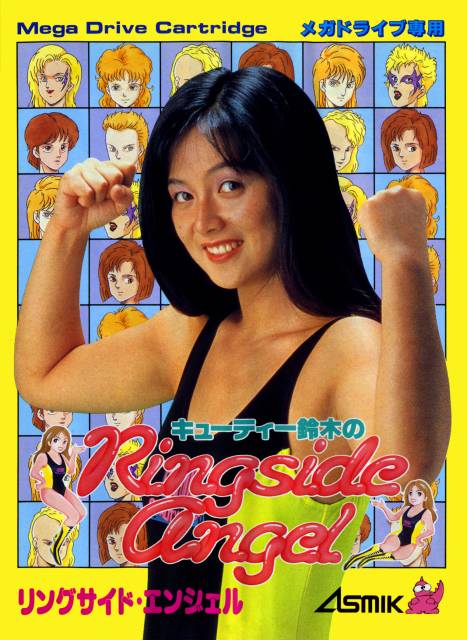
- Developer: Copya System
- Publisher: Asmik Ace
- JP Release: 12/12/1990
- NA Release: N/A
- EU Release: N/A
- Franchise: N/A
- Genre: Wrestling
- Theme: Pro Wrestling
- Premise: Cutie Suzuki takes you through the world of Joshi Wrestling in this, the first pro wrestling game for the Mega Drive.
- Availability: Licensed, so forget about it.
- Preservation: The system's first wrestling game is a Japan-only all-women one, which perhaps isn't what most WWE fans were hoping for. All the same, it has a colorful cast of mostly fake wrestlers - the eponymous Ms. Suzuki is the only real person - and a workable presentation which includes close-ups on the wrestlers' faces as they grow tired and hurt, and some play-by-play commentary which scrolls away at the top right of the screen. I can't make heads or tails of the actual gameplay myself, but then I was never adept at anything wrestling-related and I suspect a wrestling game this old wasn't very responsive to begin with.
082: Atomic Robo-Kid
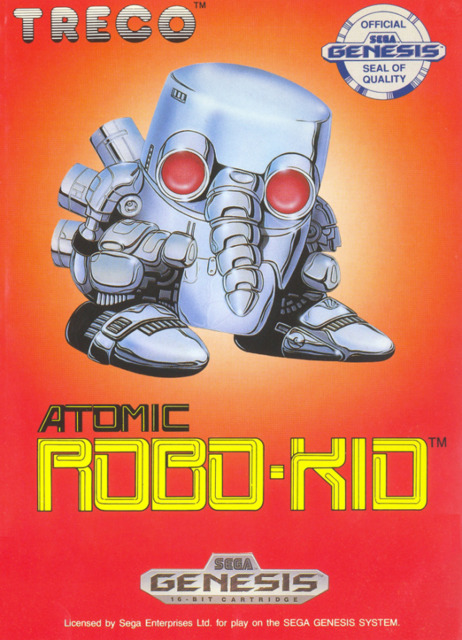
- Developer: Micronics (UPL)
- Publisher: Treco
- JP Release: 12/14/1990
- NA Release: 1990
- EU Release: N/A
- Franchise: N/A
- Genre: Shoot 'em Up (Multidirectional)
- Theme: Sci-fi
- Premise: A stumpy little robot is the only defense against a hostile alien invasion force.
- Availability: Hamster's Arcade Archives have got you covered - the arcade version is available on PS4.
- Preservation: I've met this rust bucket once before during the TurboGrafx/PC Engine wiki projects, and not a whole lot has changed here. It's a solid enough shoot 'em up, allowing you to move at your own pace rather than an auto-scroll pushing you along, but it's hard to take that clunky hero seriously. Another problem is the contract developer used for this port - Micronics - which has a very poor reputation for their shoddy work on the Famicom. If you've ever played a bad arcade port on the NES, chances are it was probably them. That we'll be seeing them on the Mega Drive too is ominous indeed.
083: Elemental Master
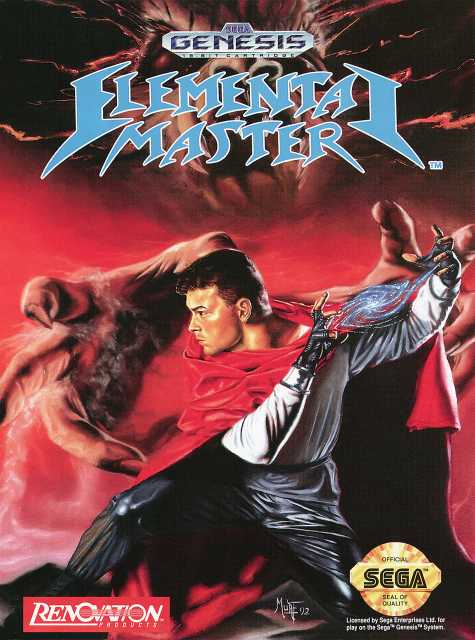
- Developer: Technosoft
- Publisher: Technosoft / Renovation
- JP Release: 12/14/1990
- NA Release: March 1993
- EU Release: N/A
- Franchise: N/A
- Genre: Shoot 'em Up (Vertical)
- Theme: Fantasy
- Premise: The sorcerer Laden chases after his brother Roki after he becomes the new body for the evil god Gyra in this magic-based shoot 'em up.
- Availability: Nope.
- Preservation: My eyes are going cross-eyed from all the shoot 'em ups this update, but Elemental Master might be my favorite of the bunch. A big part of that is the fantasy/magic aesthetic, which makes a change from all the sci-fi alien invasion business, but I also liked that it had a substantial story and a sort of Mega Man structure where you'd fight bosses in an order of your choosing and then acquired their "element" for use in other stages.
084: Gambler Jiko Chuushinha: Katayama Masayuki no Mahjong Dojo
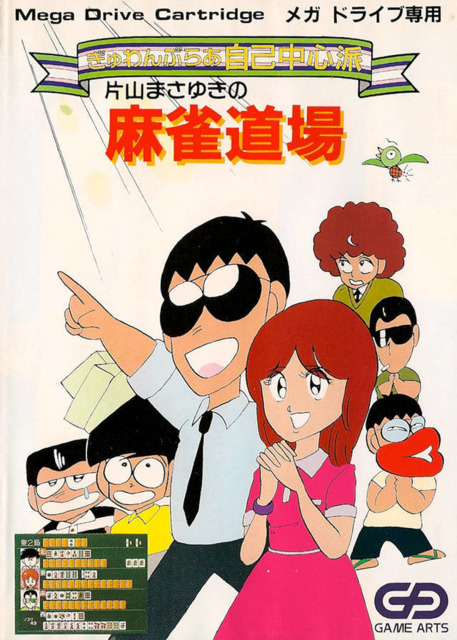
- Developer: Yellow Horn
- Publisher: Game Arts
- JP Release: 12/14/1990
- NA Release: N/A
- EU Release: N/A
- Franchise: Gambler Jiko Chuushinha
- Genre: Mahjong
- Theme: Board Games
- Premise: Gambler Jiko and friends compete in various games of mahjong in this manga licensed four-player version of the Asian game of tiles.
- Availability: Nope.
- Preservation: The system's third mahjong game is one that carries a manga license, and one I've encountered a few times before with my work on the NES library. This one is actually based on a crossover manga Katayama made featuring characters from Gambler Jiko Chuushinha and Super Zugan, which threw me for a loop for a moment. It's a bit more lighthearted and cartoonish as mahjong games go, though still every bit as boring and tricky if you don't have all the scoring rules for Japanese mahjong memorized.
085: DecapAttack / Magical Hat no Buttobi Tabo! Daibouken
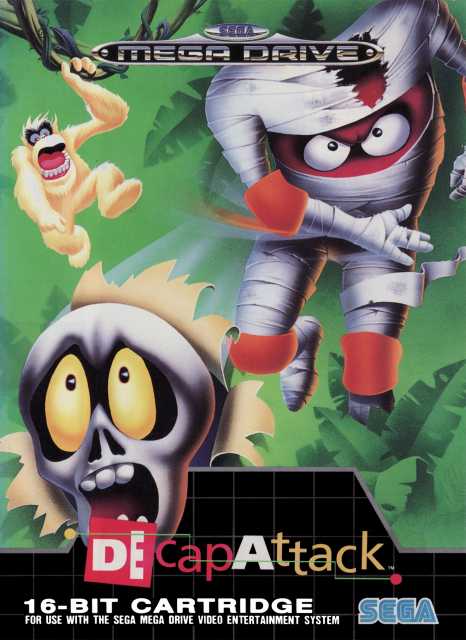
- Developer: Vic Tokai
- Publisher: Sega
- JP Release: 12/15/1990 (as Magical Hat no Buttobi Tabo! Daibouken)
- NA Release: October 1991
- EU Release: November 1991
- Franchise: N/A
- Genre: Platformer
- Theme: Comedy Horror
- Premise: The mummy Chuck D. Head is tasked by his creator Frank N. Stein to defeat the demonic Max D. Cap, who has apparently stolen everyone's middle names leaving only initials behind.
- Availability: Decap Attack is super available - it's in the most recent Sega Genesis Classics compilation and as a standalone game on Steam.
- Preservation: The Mega Drive certainly has its strengths, focusing in on what the NES (and later SNES) was lacking, which is why they largely stayed away from platformers and RPGs. DecapAttack does its best, but beyond the head tossing gimmick and kooky spooky aesthetic it's a fairly average platformer, let down by its slippery physics and maze-like level design. The original Japanese version - which underwent a Yume Kojo: Doki Doki Panic sort of situation where the game reskinned its vaguely Arabian Nights anime protagonist in the west for the sake of licensing and brand recognition factors - plays more or less the same but with a weird egg-like guy instead of Chuck's skull.
086: Dangerous Seed
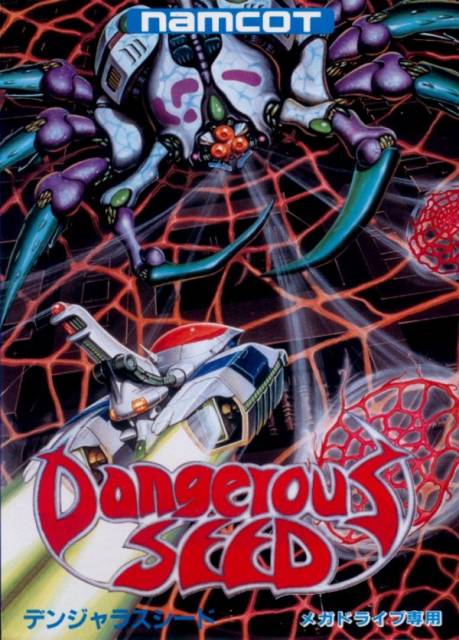
- Developer: TOSE
- Publisher: Namco
- JP Release: 12/18/1990
- NA Release: N/A
- EU Release: N/A
- Franchise: N/A
- Genre: Shoot 'em Up (Vertical)
- Theme: Sci-fi
- Premise: Three pilots take on the alien mothership, and should they all survive to the final encounter their ships combine Voltron-style into the powerful Moon Diver.
- Availability: Nope.
- Preservation: Welcome to the Mega Drive, TOSE. TOSE has this odd reputation as a secretive contract developer that always delivers on what their employers pay for, leading to a significant standard deviation in quality between the many, many games they developed or co-developed for various publishers. Anyway, this particular shoot 'em up is about watermelon seeds because - as everyone knows - they can grow into entire watermelons inside your stomach. I heard it happened to a kid in my school!
087: Arrow Flash
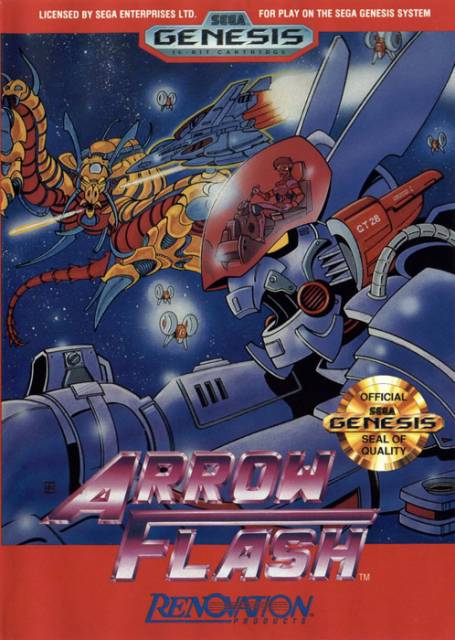
- Developer: ITL
- Publisher: Sega / Renovation
- JP Release: 12/20/1990
- NA Release: January 1991
- EU Release: May 1991
- Franchise: N/A
- Genre: Shoot 'em Up (Horizontal)
- Theme: Sci-fi
- Premise: Female pilot Anna Schwinn/Zana Keene fights aliens in her transformable mecha-ship created by her grandfather (who was also the scientist that accidentally beckoned the aliens over to our side of the galaxy).
- Availability: Nope.
- Preservation: So here we have another shoot 'em up created specifically for the console, rather than an arcade port. If you've been paying attention to previous cases like this, it means that the game is far better optimized for the platform. It also has this neat little animated intro that feels right out of a Gundam anime (or Macross perhaps, given that there's some incidental shared history), which also manages to squeeze in a little tutorial for the "arrow flash" maneuver of a title - a super powerful move that performs differently whether you're in the ship mode or mecha mode. It's still a generic shoot 'em up, mind, and one that made the slight tactical error of releasing on the same month as eight others.
088: Crack Down
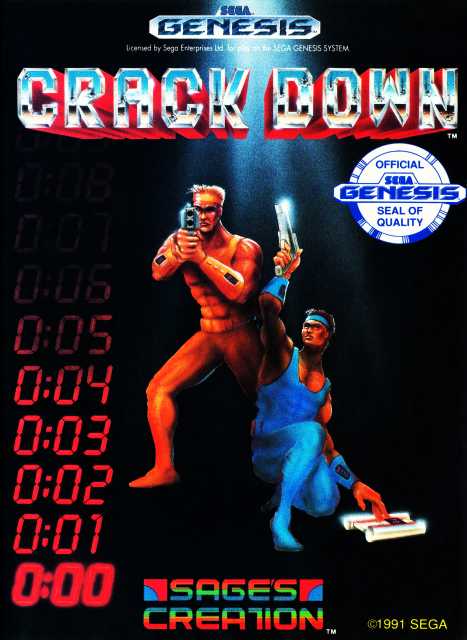
- Developer: Hot-B
- Publisher: Sega / Sage's Creation
- JP Release: 12/20/1990
- NA Release: May 1991
- EU Release: January 1991
- Franchise: N/A
- Genre: Shooter (Top-down)
- Theme: Sci-fi
- Premise: Two ripped goons wander around mazes deactivating bombs and taking out robotic terrorists in Sega's multiplayer shooter.
- Availability: Yup, part of Sega Genesis Classics and as a standalone game on Steam.
- Preservation: Despite the difficulty and literal ticking time bomb pushing you forward, I've always liked Crack Down. It's somewhere between Metal Gear and Smash TV in terms of pacing, forcing you to methodically clear out enemies on the way to bomb zones while also not dawdling as you usually only have a few minutes to clear the whole stage. This port had some issues - Sega commissioned Hot-B to pinch hit for them, and apparently didn't do much to help them out - but it's serviceable enough.
089: Sagaia / Darius II
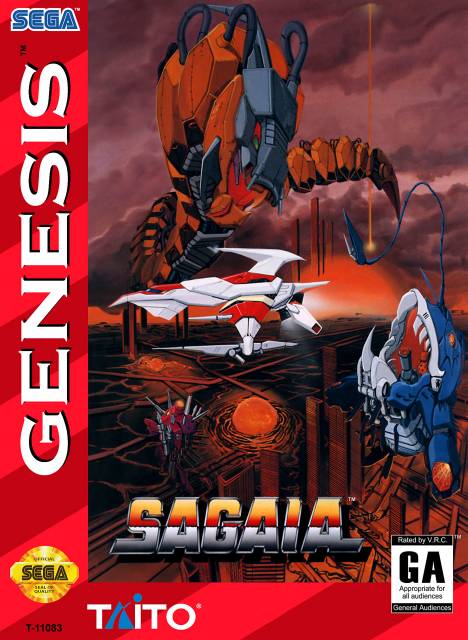
- Developer: Taito
- Publisher: Taito
- JP Release: 12/20/1990 (as Darius II)
- NA Release: April 1991
- EU Release: N/A
- Franchise: Darius
- Genre: Shoot 'em Up (Horizontal)
- Theme: Sci-fi if the "fi" stands for "fish"
- Premise: A big alert goes up; something's approaching at a rapid speed! That something is yet another December '90 shoot 'em up with an alien invasion theme.
- Availability: Darius II was featured in Taito's Japanese Taito Memories compilations but none of the localized Taito Legends compilations. So, not too available.
- Preservation: The trouble with home ports of Darius games, besides the weird names they come up with for international releases, is that their big innovation was the plus-sized screens in their arcade cabinets. Expanding a horizontal shoot 'em up across several monitors side-by-side allowed the player to see far behind and in front of them, helping them adapt to whatever was approaching. None of the home versions have this, of course, which makes the only remaining draws the branching paths and the giant robot sealife that attack after portentous warnings.
090: Hard Drivin'
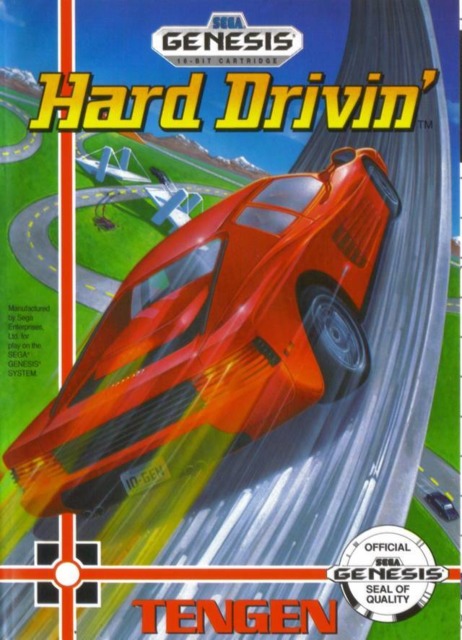
- Developer: Sterling Silver Software
- Publisher: Tengen
- JP Release: 12/21/1990
- NA Release: 1991
- EU Release: December 1991
- Franchise: Hard Drivin'
- Genre: Drivin'
- Theme: Motorsports
- Premise: Drop some Gs both literally and literarily in this high-speed polygonal arcade racing game port from Atari/Tengen.
- Availability: The arcade version is part of Midway Arcade Treasures 2, a PS2/GameCube/Xbox era compilation.
- Preservation: A technical showcase for 1989/1990 Atari's fully polygonal racer was a big deal at the time, though now it's hopelessly outdated unless you have a real thing for racing against crates with wheels. Being an arcade racer, it still has an excellent sense of speed and control - well, to the degree that the Mega Drive can keep up with the visuals without lagging - and is kind enough to offer manual or auto transmission for those who want either. Once the 3D novelty wears off and you've tried the loop-de-loop or plowing into buildings a few times for that neat cracked windshield effect, there's not a whole lot of content to keep you occupied for long.
091: M.U.S.H.A.: Metallic Uniframe Super Hybrid Armor / Musha Aleste
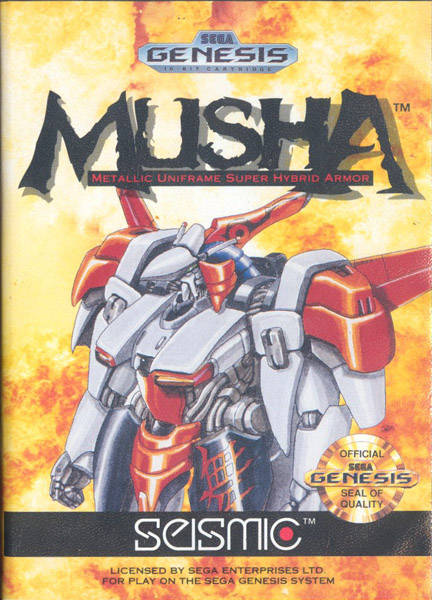
- Developer: Compile
- Publisher: Seismic / Toaplan
- JP Release: 12/21/1990 (as Musha Aleste)
- NA Release: 1990
- EU Release: N/A
- Franchise: Aleste
- Genre: Shoot 'em Up (Vertical)
- Theme: Sci-fi / Mecha
- Premise: You'd think those darn aliens are back to invade Earth and human-occupied space, but this time our own computers have turned against us. That shouldn't be a problem for Terri/Ellinor, the sole-surviving pilot of a mecha squadron (and another female protagonist! Yay! Shades of Patlabor's Noa Izumi with her design).
- Availability: There's a Wii Virtual Console port, but I think that's it. Weird we don't have a Compile Compilation for their shoot 'em ups, considering their name. Too on the nose maybe?
- Preservation: Compile's back, and this time they're bringing what they're best known for - shoot 'em ups, particularly those of the Aleste franchise - to a system clearly lacking them this month. Like Arrow Flash, MUSHA's female protagonist flies a mecha into battle which can carry a wide variety of weaponry. It also has vaguely anime framing cutscenes too. Bad luck they landed on the same month, huh? Fun fact: "Musha" means "warrior" in Japanese, indicating that this particular Aleste game wasn't messing around. For its international release though, the smartasses behind the localization decided to turn the word into a science-y backronym.
092: Star Cruiser
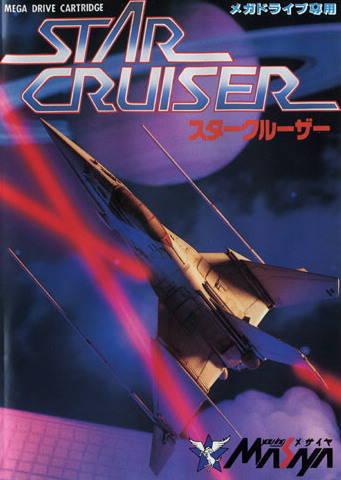
- Developer: Arsys
- Publisher: Masaya
- JP Release: 12/21/1990
- NA Release: N/A
- EU Release: N/A
- Franchise: N/A
- Genre: FPS / Adventure / RPG
- Theme: Sci-fi / Mecha
- Premise: Take control of a mecha in one of the Mega Drive's earliest polygonal games, an adaptation of an ambitious first-person computer game of some repute.
- Availability: Nope.
- Preservation: Though I couldn't get far with its text-heavy interface, Star Cruiser seems like a hugely ambitious game that didn't get the recognition it deserved outside of its native land, offering a fully 3D, fully open-world sci-fi FPS game with an in-depth story told in visual novel interfaces and cutscenes and featuring the occasional outer space dogfight or on-foot mecha battles. Attempts to release the Mega Drive version States-side were ultimately thwarted, and by that time (1993) other games were able to replicate its trailblazing accolades in their own way, from Doom's sci-fi FPS corridor shooting to Frontier: Elite II's heavy space simulation and open-world aspects. It's another reminder, if I needed one, that early Japanese computer gaming is an undiscovered country.
093: Wonder Boy III: Monster Lair
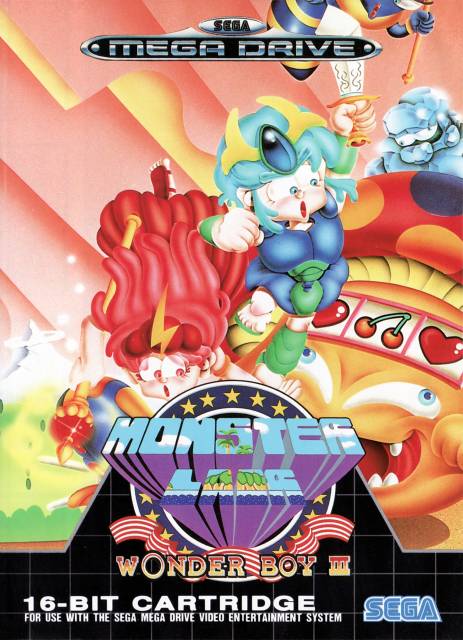
- Developer: Aicom
- Publisher: Sega
- JP Release: 12/22/1990
- NA Release: N/A
- EU Release: April 1991
- Franchise: Wonder Boy
- Genre: Platformer
- Theme: Fantasy
- Premise: Westone's platforming hero Wonder Boy makes his debut on the Mega Drive with his third game, Monster Lair, courtesy of Aicom.
- Availability: It's part of the Sega Genesis Classics compilation as well as a standalone game on Steam and Wii Virtual Console.
- Preservation: This was the last game that played like the original Wonder Boy, which was the basis for Adventure Island and mostly involved a lot of running to the right before you starved to death. Other Wonder Boy games, like those in the Monster World franchise, played a bit more conservatively and had RPG elements like stores and upgrades. This was one of the few rare games to see a European release but not a North American one; however, they would get to play the game eventually via its later digital rereleases.
094: Gaiares
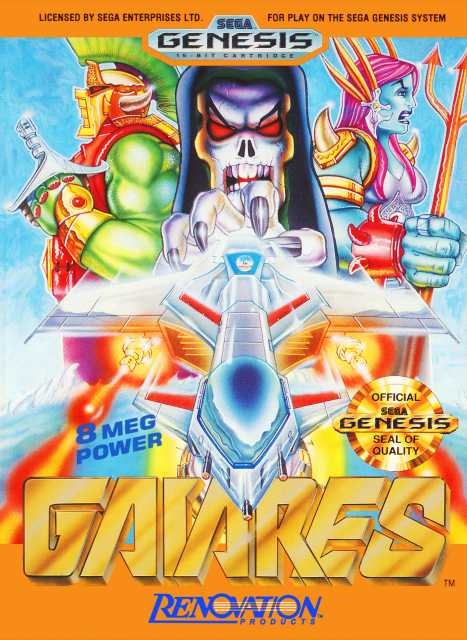
- Developer: Telenet Japan
- Publisher: Telenet Japan / Renovation
- JP Release: 12/26/1990
- NA Release: February 1991
- EU Release: N/A
- Franchise: N/A
- Genre: Shoot 'em Up (Horizontal)
- Theme: Sci-fi
- Premise: OK, this one's our fault. We polluted Earth so much that space pirates intend to turn Earth into a giant dirty bomb. The equivalent of the space cops give us one chance to fix the situation, or they're detonating our sun. Fair enough.
- Availability: Nope.
- Preservation: Whee, more shoot 'em ups. Gaiares comes to us from Telenet Japan, or Nihon Telenet, a game developer better known for CD games like Valis on the Turbo-CD/PC Engine CD. However, we've seen games from their subsidiaries on the Mega Drive before: in particular Wolf Team, the guys behind Final Zone and Granada, and their American publishing wing Renovation, who we've already seen twice today with the localizations of Elemental Master and Arrow Flash. Telenet would establish a firm relationship with Sega once the Mega-CD rolled around. As for Gaiares, it's another horizontal shooter with a heavy dose of anime cutscenes to frame its story of space pirates and stalwart heroic pilots. Looks great, but beyond an interesting gimmick where you steal power-ups from enemies, it's a run-of-the-mill Gradius/R-Type clone.
095: Heavy Unit: Mega Drive Special
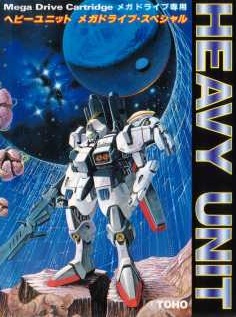
- Developer: Funari
- Publisher: Toho
- JP Release: 12/26/1990
- NA Release: N/A
- EU Release: N/A
- Franchise: N/A
- Genre: Shoot 'em Up (Horizontal)
- Theme: Sci-fi / Mecha
- Premise: Another day, another alien invasion that only a transforming mecha-spaceship can solve.
- Availability: Nope.
- Preservation: I tried to delve into why this game was published by Toho of all people, since the movie studio wasn't really big on games that didn't have giant lizards in them, but was unable to find a satisfactory answer. They also handed the reins to the unknown Funari, who would only create this one game for the Mega Drive. In addition, despite labelled a "Special" edition of the game, the Mega Drive version doesn't really have a lot to distinguish it from the arcade original, nor - for that matter - the considerable number of other MD shoot 'em ups released this month, many of which also involved mecha.
096: Ishido: The Way of Stones
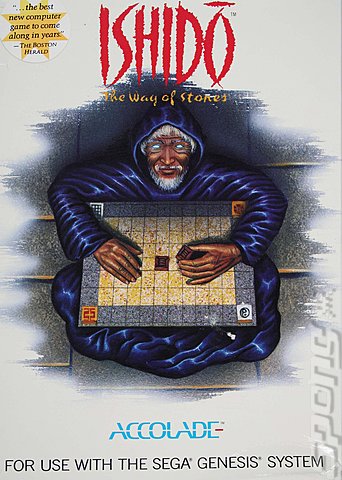
- Developer: Accolade
- Publisher: Accolade
- JP Release: N/A
- NA Release: 1990
- EU Release: N/A
- Franchise: N/A
- Genre: Puzzle
- Theme: Uh, fake Eastern mysticism?
- Premise: Accolade brings their computer puzzle game to the Sega Genesis, albeit in an unlicensed form that turned out to be not entirely strictly legal.
- Availability: Due to the unique circumstances of its release outlined below, it's unlikely that even the original cart will work for your Genesis. Fortunately, Ishido was released on a lot of other systems. It's even in Microsoft Entertainment Pack 2 for early Windows OSes.
- Preservation: So yeah, this one has quite the history. Ishido was released on a lot of systems prior to the Genesis, but in 1990 Sega's console was the hottest thing in town. Accolade didn't feel like paying Sega a huge cut for the privilege on being on their system, so they sneaked the game out without the proper licensing by reverse-engineering the cart technology, sort of like what Tengen did with the NES. That lead to Sega putting out a newer model Genesis that locked out unlicensed games like Ishido, which Accolade eventually got around again leading to a massive lawsuit between the two companies. Suffice it to say, any Genesis model made after 1990 will not play this game, and honestly it's no big loss. Ishido is just gussied up dominoes, really.
097: Sword of Sodan
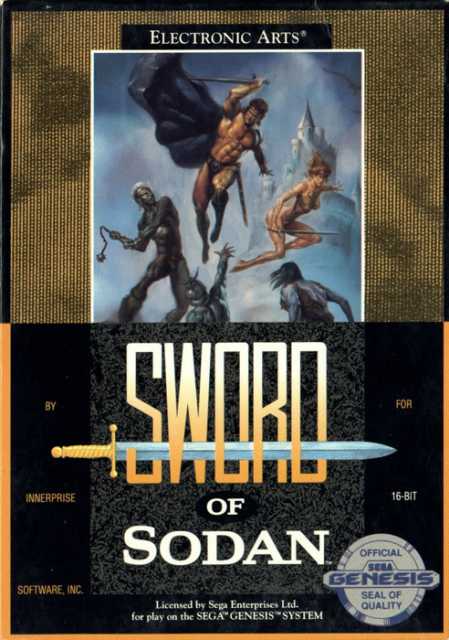
- Developer: Innerprise
- Publisher: Electronic Arts / Sega
- JP Release: 10/11/1991
- NA Release: 1990
- EU Release: January 1991
- Franchise: N/A
- Genre: Brawler / Action
- Theme: Fantasy
- Premise: The royal children of Lordan are taken to be raised safely away from the evil of the necromancer Zoras. When they come of age, they decide to take their kingdom back from the magical interloper.
- Availability: Nope. No-one's really in a rush to preserve this one.
- Preservation: Another Amiga migrant, Sword of Sodan is legendary for its awfulness, featuring clunky and slow controls, a lack of direction, and some grisly graphics and sound. The computer original was better, I swear. At any rate, I wasn't prepared to play this for any longer than I needed to for all the necessary screenshots. If, like China Warrior, the only good thing you can say about your game is "hey, the sprites are pretty big", you might want to rethink some things.
098: Trampoline Terror!
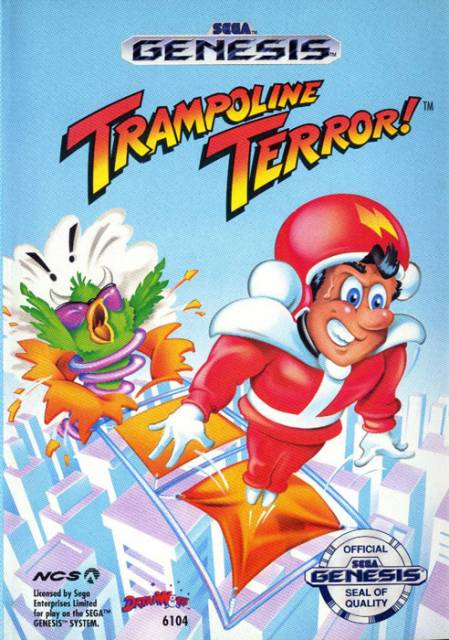
- Developer: Masaya
- Publisher: DreamWorks
- JP Release: N/A
- NA Release: 1990
- EU Release: N/A
- Franchise: N/A
- Genre: Platforming / Puzzle
- Theme: Sci-fi
- Premise: In this top-down action game, the hero must save Earth from an alien invasion. But rather than use a spaceship like a normal person, they instead use trampolines. I'm thankful for the variation, honestly.
- Availability: Nope.
- Preservation: Trampoline Terror's kind of fun actually, and definitely a tonic after all the shoot 'em ups this week. It reminds me a lot of the sort of games that would frequently pop up on NES with bizarre puzzle concepts and abstract visuals, like Clu Clu Land or Kickle Cubicle. For whatever reason, the Japanese developers Masaya launched it in North America first, perhaps testing the waters, before deciding against releasing it in their home turf. With its colorful cutesy look, it really seems more like a game that would appeal to that market first and foremost. Genesis kids in the US would probably balk at its kiddy appeal and pick something with swords or skulls in it instead.

2 Comments